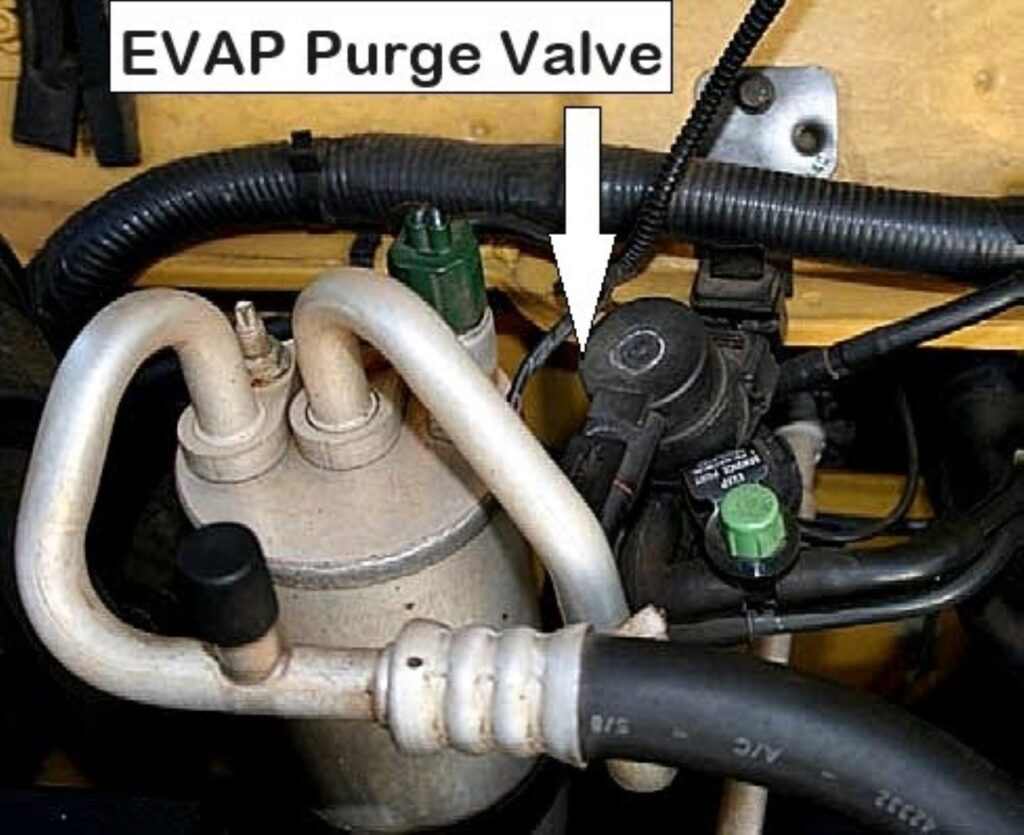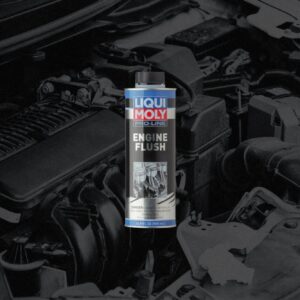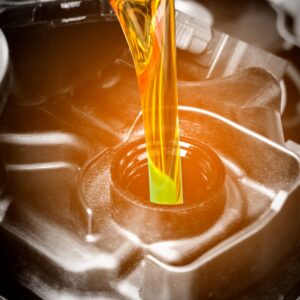It’s always a cause for concern whenever the engine starts making noises that it shouldn’t make. One sound that no driver should ever ignore is an audible ticking or tapping sound coming under the hood.
Why Is My Engine Ticking?
Various issues can cause engine ticking sounds, such as lifter tick, dirty lifters, exhaust leaks, bad bearings, loose parts, ignition problems, misaligned valves, spark plugs that are loose, or even a mispositioned evaporative purge valve.

Lifter Tick
The hydraulic valve lifter is a small cylinder attached to the hydraulic valve via a rod called the rocker arm. When the moving parts wear, malfunction, or are damaged so that they don’t hold oil pressure that cushions their movement and keeps the valve lash correct, the lifter produces a ticking or tapping noise referred to as “lifter tick.”
Other worn or loose valve train parts like rocker arms can cause a clicking noise as well. One worn camshaft lobe can cause a clicking noise that may be intermittent.
Other possible lifter tick causes include low oil level or pressure or various other worn engine components. With low oil level and the resulting low pressure, the valve train is the first part of the engine to suffer, which will eventually cause problems with the lifters, followers, or the camshaft.
Other worn or loose valve train parts like rocker arms can cause a clicking noise as well. One worn camshaft lobe can cause a clicking noise that may be intermittent.
–Richard McCuistian, ASE Certified Master Automobile Technician
Injector Noises

Exhaust Leak
A leakage in the exhaust system like a cracked cast iron exhaust manifold can create a clicking noise that will go away as the engine warms and the manifold expands to close the crack. The noise can come from anywhere in the exhaust, but becomes more prominent if the leak is closer to the engine, like in the exhaust manifold.
On front wheel drive cars, if the leak is coming from the front of the engine near the top, it can be telegraphed under the plastic engine cover and sound like it’s coming from the top rear of the engine rather than at the exhaust crack where it’s originating.
One way to deal with the issue is to find the source by checking exhaust system components. Start with the gasket, the exhaust manifold, and then the pipes/flanges. Black sootsmay be an indicator that the leak is in the area.
Bad Bearings
The bearings reduce friction and ensure smooth rotation of different parts in the engine. Once they’ve worn, bearings lead to excessive ticking noise that eventually leads to an engine knock as the bearings continue to wear. Worn bearings will cause the oil pressure to drop, which can create valve train noise. On engines with hydraulic timing chain tensioners, the low oil pressure can cause the timing chain to rattle and wear out more quickly as well.
Lack of lubrication and bearing damage are two potential causes of the noise, as well. It’s crucial to address the issue as soon as possible because it could lead to engine failure.
Loose Parts
The engine has a fan that could cause a ticking or tapping noise when damaged. Similarly, loose parts within the engine can produce a similar sound. You can investigate this by visually inspecting the fan blades and shroud while the engine is off.
Ignition Issues
An ignition spark leak will make a popping noise you might hear when the hood is open, but you won’t usually hear it from inside the car. Usually the spark leak will be accompanied by a skip, and the spark may only leak and pop while the engine is under load, or it may pop/click either intermittently or regularly while the engine is idling.
One or More Loose Spark Plugs
Loose spark plugs can cause ticking noises in the spark plug area, and this should not be hard to verify.
How to Fix the Ticking Noise in the Engine
The best way to deal with the ticking noise coming from the engine is to find the cause and deal with it promptly. Note, however, that this is easier said than done, and the repairs can be complex enough that you may need to have them done at a service outlet instead of at home.
If the clicking is there all the time, you can hold a piece of heater hose up to one ear while carefully checking for the place where the ticking noise seems to be the loudest. Also, a mechanic’s stethoscope doesn’t cost much and can help find a ticking noise, but always be very careful around moving engine parts.
Here are the usual solutions when the issue involves oil-related problems, exhaust leaks, and bad bearings.
Identify Oil-Related Problems
Check the oil level by pulling the dipstick out, cleaning it off, reinserting it, then pulling it out. Add more oil if it’s at the low mark or below. Frequently check the level and ensure no leaks under the vehicle or the hood.
Inspect the oil pressure next. There’s usually an oil pressure gauge on the instrument panel. If your car doesn’t have one, follow the steps below to check:
- Step 1: Locate the oil pressure or temperature sender in the engine block near the sump. Remove the switch and use an oil drip tray to catch any oil.
- Step 2: Use an oil pressure test kit, attach the oil pressure gauge to the adaptor, and start the vehicle.
- Step 3: Consult a service manual to determine what rotation per minute (RPM) is best to perform the test and what pressure the engine needs to maintain.
- Step 4: Turn the engine off and let it cool, remove the oil pressure test gauge, then re-install the oil pressure sensor.
A PSI of 25-65 while the engine is running indicates the pressure is normal. On engines with hydraulic timing chain tensioners, pressure that is near or below 25 psi can cause timing chain noises.
Search for Exhaust Leaks
Fixing exhaust leaks could be tricky for DIY-ers. However, you can still check and confirm its presence before taking your car to an auto shop by following the steps below:
- Step 1: Jack up your vehicle and inspect the exhaust lines/manifold for holes, cracks, loose seams, or soot on the pipe exterior.
- Step 2: Connect the blower outlet of a vacuum to the tailpipe and feel for air blowing out of the exhaust line. Spray the exhaust line with soapy water while the vacuum blows air through the system.
- Step 3: Look for spots where bubbles are forming to locate the leak.
Adjust or Replace Loose Parts
Check the heat/dust guards, metal lines, brackets, and anything else that vibrates and could knock around other parts. Usually, the ticking or knocking sounds are due to one component making contact with another. If you find any loose parts, adjust or replace them.
Take Your Vehicle to a Mechanic
Taking your vehicle to a mechanic is the easiest way to deal with the ticking noise coming from the engine. You can mention where you suspect the sound is coming from, but the mechanic will likely perform an overall inspection to be sure.
The price of the repair/replacement depends on what part is damaged, how long the process takes, and the labor fee of the auto shop.
Replace the Faulty Parts Causing Engine Ticking Today
As a responsible car owner, you should never ignore unusual sounds in your vehicle, and that includes engine ticking. Most issues that cause engine ticking can also cause a handful of other issues. For example, an exhaust manifold leak can eventually lead to catalytic converter failure. To avoid a bigger repair bill, it’s best to replace the faulty parts causing your engine to tick as soon as possible. Luckily, getting replacement parts is fast and easy with CarParts.com.
As a one-stop shop for OE-grade parts, CarParts.com offers a wide selection of high-quality valve filters, exhaust manifolds, and spark plugs. In other words, you can pretty much find everything you need here. The best part is you don’t even have to leave the comfort of your own home. With just a few clicks, you can place an order, and we’ll deliver what you need right to your doorstep. If you order by 12 PM ET, you can even expect your part to arrive in as fast as two business days.
Don’t wait until defective parts damage your engine before replacing them. Check out our selection of high-quality valve lifters, exhaust manifolds, and spark plugs at CarParts.com and order one for your vehicle today!
Any information provided on this Website is for informational purposes only and is not intended to replace consultation with a professional mechanic. The accuracy and timeliness of the information may change from the time of publication.

































